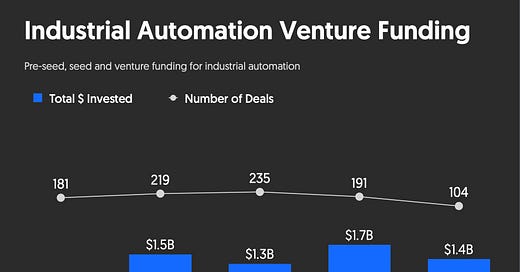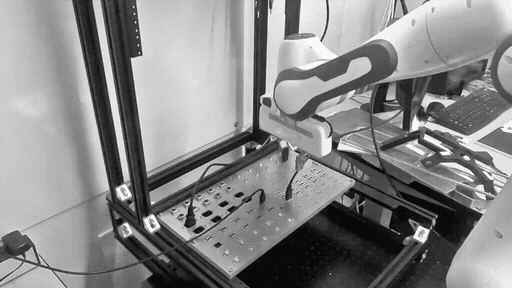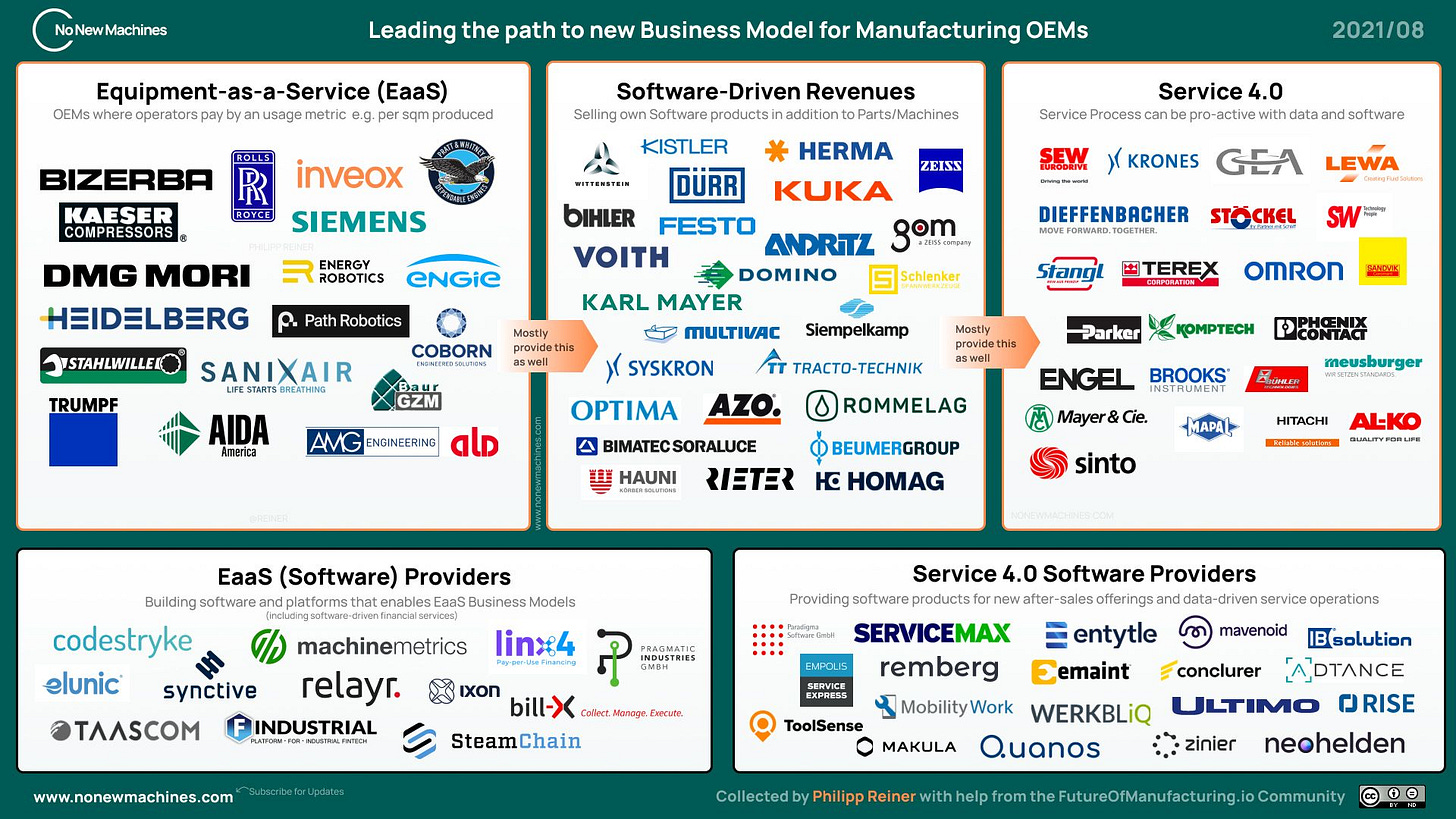Issue #34 - The Future of Manufacturing
Topics this time: our new course, robots, robots, robots, software migration to the cloud, several growth rounds, and two industrial software landscapes.
👋 Welcome to Issue #34 👋
An Update on Courses & Community:
👩🎓 Our courses: Our first course about Digital transformation in manufacturing #01 was a great success (NPS: 78 🔥).
We just opend up the registrations for our next course in Digital transformation in manufacturing #02. Subscribers to our newsletter get a 20% discount (code: I40NL). To get a glimpse into our course, we’re doing a free webinar about our Industry 4.0 landscape next Wednesday. You can sign-up here.🚀 We’re hiring to scale our course programs. Come and join us:
👪 Future of Manufacturing Community: We have 180+ members in our community by now and we will invite more people over the next months. As a reminder, this community is designed for people who work on the digital transformation in manufacturing, coordinate and drive digitization projects, and scout new ideas. Please note, building a diverse community is a key priority for us. Join the waitlist here and follow us on LinkedIn to stay up-to-date.
Got a friend or colleague interested in the future of manufacturing? Help me spread the word by sharing the newsletter if you like it!
I. What I’ve enjoyed reading 👇
👩🏭 Industrial automation venture funding is on the rise (again).
The total investment amount in industrial automation is on track to cross $2bn this year. Big investments rounds into companies such as Cognite ($150M Series B) or Locus Robotics ($150M Series E) are contributing to that trend. After several years of being stuck in the pilot purgatory hell, enterprise companies are realizing the value and are more ready to buy now according to the report. The pandemic and macro trends such as the labor shortage are forcing manufacturing companies to look for new ways to increase efficiency. Here is an overview of the total investment amount in the last few years:
🏭 Strong growth in robotics in warehouses until 2030.
A strong growth driver for venture funding in industrial automation is automation in the warehousing industry. The increase in volume and labor shortages fuel the adoption of technology solutions, ie. mobile autonomous robots (AMR), autonomous guided vehicles (AGV), handheld devices, or AR-powered smart glasses.
According to ABI Research, worldwide commercial robot revenue in warehouses will exceed $51bn by 2030, resulting in a CAGR of over 23% from 2021 on. As a result of this, the surrounding ecosystem of software vendors and systems integrators is also maturing. Therefore, integrations into existing systems play a key role in purchasing decisions. Since it’s such a fast-growing market, I believe there is enough room for several new players to emerge.
Procter & Gamble is a good example of using high-speed automation and robots. To keep production costs as low as possible, the company is using robots for different use cases such as wrapping up its skincare products. Not surprising but the company also sees lots of potential in adding more mobile robots to its plants.
🤖 Google’s Alphabet launches a new company to build software for industrial robots.
Intrinsic is a new company that comes out of Google’s parent company Alphabet with the goal to build software for industrial robots. Alphabet has been interested in robotics for years but has not managed to produce any commercial hits. Intrinsic’s focus is to develop software tools to “make industrial robots easier to use, less costly and more flexible”. To do so, the company is using different techniques such as deep learning, reinforcement learning, and simulation. You can read the announcement of Intrinsic from its CEO Wendy Tan White here and look at an example of a robot at the Intrinsic lab that uses machine learning and force control to insert three different types of power connectors (click here if the picture does not load):
👩🚀 Assisting humans is easier than replacing them.
Even though the adoption of robotics is growing strongly, they won’t replace humans anytime soon. It’s a fundamental misconception. I’ve been writing about this topic for years now and every now and then there are new studies that confirm this fact. This article by Fast Company sums up different studies that underline the importance of cognitive abilities for different jobs and that robots lack the common sense, wisdom, or critical thinking skills required to do a good job. Robots will play a crucial role in the future but more for assisting humans rather than replacing them.
☁️ Manufacturing is (finally) migrating to the cloud.
According to IoT Analytics, cloud adoption for manufacturing software is accelerating. This is visible across different software solutions such as PLM, CMMS, and MES. Especially the cloud MES market is expected to grow significantly and reach $2.34bn by 2026. 29% of respondents in the survey will move their MES to the cloud within the next two years - which is a great opportunity for all the younger companies in that area to replace on-premise incumbents.
II. About industrial Startups and Companies 👇
🤑 Tulip has raised $100M led by Insight Partners.
Tulip, the company that calls its product a “connected frontline operations platform”, has raised $100M led by Insight Partners with the participation of Salesforce founder Marc Benioff. This brings its total funding to $153M even though Tulip’s co-founder underlines that he is “at the point where [he is] not doing this for incremental money. [He is] not going to have a bigger idea than this.”
The platform offers manufacturers an app library that they can customize to their own needs and use cases. To date, Tulips product is used in more than 35 countries and its customers have created more than 20,000 Apps.
🤑 Zetwerk has raised $150M Series E led by D1 Capital Partners.
B2B marketplaces are particularly interesting in emerging countries with less legacy infrastructure and software. Zetwerk, a manufacturing-as-a-service marketplace from India, has just raised a $150M round that values the company at $1.33bn. That’s roughly double the valuation compared to last February. The company is doing nearly $130M in revenue and has already expanded to Southeast Asia and North America.
🤑 Path Robotics and Rapid Robotics have raised millions of dollars from Tiger Global.
After announcing its $56M Series B in May this year, Path Robotics just closed another investment round: $100M Series C led by Tiger Global. This gives the company additional resources to develop its fully autonomous and intelligent robotic welding cells.
Tiger Global also recently invested in the $37M Series B of Rapid Robotics. The company sells robotics-as-a-service, ie. robots that can be deployed in a matter of hours, without the need for programming and other robotics knowledge. Rapid Robotics raised its seed round in 2020 and is already valued at $192.5M.
For those who are not very familiar with Tiger Global - the hedge fund has made a big splash in the venture market this year by investing in lots of tech startups at record speed.
🤑 Varda Space has raised $42M led by Khosla Ventures and Caffeinated Capital.
After completing a $9M seed round in December 2020, Varda Space Industries just raised a $42M Series A led by Khosla Ventures and Caffeinated Capital. The goal of the company is to open up manufacturing processes for products such as bioprinted organs or fiber-optic cables that need fundamentally different conditions than what’s available on-planet (“microgravity manufacturing”). One of the biggest barriers today is the associated costs. To start with, the company will build the products itself in space but the long-term goal is to become a contract manufacturing platform for other companies. Varda Space Industries got started by an ex SpaceX veteran and a principal at Founders Fund - a venture fund that invested $20M in SpaceX in 2008.
🤑 Noyes Technology has raised $3.8M led by Vsquared Ventures.
To build robot-operated and highly flexible nano fulfillment warehouses, Noyes Technology has raised $3.8M led by Vsquared Ventures. The company was started by two longtime former BMW employees and will use the money to accelerate product roll-out and to develop its robotic warehousing technology. Warehousing space in dense urban environments is scarce, so nano fulfillment warehouses can provide a viable alternative at a lower cost.
🤖 ABB to acquire AMR company ASTI Mobile Robotics Group.
To expand its robotics and automation offering, ABB has acquired ASTI Mobile Robotics Group, a company that is developing intelligent autonomous mobile robots (AMRs). The acquisition will help ABB’s customers to roll out fully flexible networks in factories, logistics centers, laboratories, shops, or hospitals. ASTI, which got started in 1982, is expected to make $50M in revenue this year, the acquisition price has not been disclosed.
III. Additional funding news in short 👇
👉 Third Wave Automation (US): to develop autonomous forklift technology, the company has raised $40M in a Series B round led by Norwest Venture Partners. Read more…
👉 Monolith (UK): the AI engineering software company has raised £8.5M led by Insight Partners. Read more…
👉 Nozomi Networks (US): the industrial cybersecurity company has raised $100M in pre-IPO funding. Read more…
👉 Fashinza (India): the manufacturing platform for the apparel industry has raised $20M led by Accel Partners. Read more…
👉 Neurala (US): the company that develops AI solutions for manufacturing has raised $12M led by Zebra Ventures. Read more…
IV. Additional content and the I40 Landscape 👇
Equipment-as-a-service (EaaS) landscape
Manufacturing OEMs are going into new business models with software and data-driven after-sales services. Our community member Philipp Reiner has created this landscape (100+ companies) that shows current examples and interesting companies in this space: from EaaS to own software offerings to smarter services with data and IoT. Software again eats the industry and will create new business opportunities. He also summarized his learnings in this blog post here.
Industry 4.0 Map - Reinventing the Factory Stack
🆕 New milestone reached: there are now more than 500 industrial startups in the landscape after updating it in early July. Join our webinar next week where we share more info about the landscape and its development over the years.
Thanks to everybody for supporting this newsletter! Comments, questions, or additional thoughts? Send me a note 🙏
Robin








